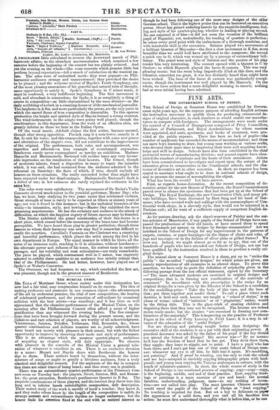THE MUSICAL UNION.
Ma. ELLA of Mortimer Street, whose society under this' designation has now had a fair trial, may congratulate himself on its success. The idea of uniting professors and amateurs in one common object—the advancement of the art by orchestral practice, the trial of new compositions, the hearing of celebrated performers, and the promotion of self-culture by occasional collision with the best artists—was excellent; and it has been so well appreciated that the chamber-performances of the Musical Union on the morning after the Philharmonic Concert often afford a scene of higher gratification than any witnessed the evening before. The fine composi-
. — 'ions that have been brought forward during the present season, and the judicious and rare selection of players, are worthy of all acknowledgment. Vieuxtemps, Sainton, Deloffre, Tolbecque, Hill, Rousselot, &c., whose quartet combinations and delicate nuances are so justly admired, have been heard not merely with pleasure in their music, but with the fullest opportunity to improve by observing their mode and style of performance. This is an advantage which the amateur quartet-player, ambitious of acquiring an elegant style, will duly appreciate. We observe with pleasure in the concerts of the Musical Union a general tole- ration of whatever is excellent in art. There is no exclusive devotion to a name: Mozart and Haydn share with Beethoven the honour due to them. These authors heard by themselves, without the inter- mixture of songs or aught to gratify a frivolous audience, form a truly classical and delightful concert. For the aspirants of the day in composi- tion there are other times of being heard; and thus every one is gratified.
There was an extraordinary quartet-performance at the Princess's Con- cert-room on Tuesday last: the players, Sivori, Sainton, Hill, and Ronsee- lot; the great attraction, Beethoven's posthumous Quartet in B flat. The exquisite combinations of these players, and the interest they threw into this long and in inferior hands unintelligible composition, defy description. Their united study of the work is merely of itself a wonder: they know it, and they make others know it the length of the composition is unfelt, its strange accents and extraordinary rhythm no longer embarrass; but the hearer finds his attention fixed at the end with as untired interest as though he had been following one of the more easy designs of the older German schooL This is the highest praise that can be bestowed on executive power. Sivori has gained =fading laurels by the exquisite intelligence, feel- ing, and style of his quartet-playing, whether in leading or playing second. No one expected it of him—it did not seem the vocation of the brilliant pupil of Paganini; yet, undoubtedly, his reading of quartets is perfection: he seizes every good point with the enthusiasm of a thorough musician, and with inimitable skill in the execution. Sainton played two movements of a brilliant Quartet of Mayseder—the first a slow movement in E flat, more beautiful than we could well have attributed to the composer; the second a quick one in G, which was wound up by a passage of extraordinary bril- liancy. The grand tone and style of Sainton and the passion of his play render him very interesting. The concert opened with a Quintet in C by Onslow; to which Hancock played the basso di camera. This was very pleasing music; but the room being imperfectly filled at this time, and the vibration somewhat too great, it was less distinctly heard than might have been wished. The buzz of the basso di camera was particularly conspi- cuous, though the instrument was well played by Mr. Hancock. On the whole, we have seldom had a more delightful morning to record; nothing bad or even trivial having been admitted.


























 Previous page
Previous page